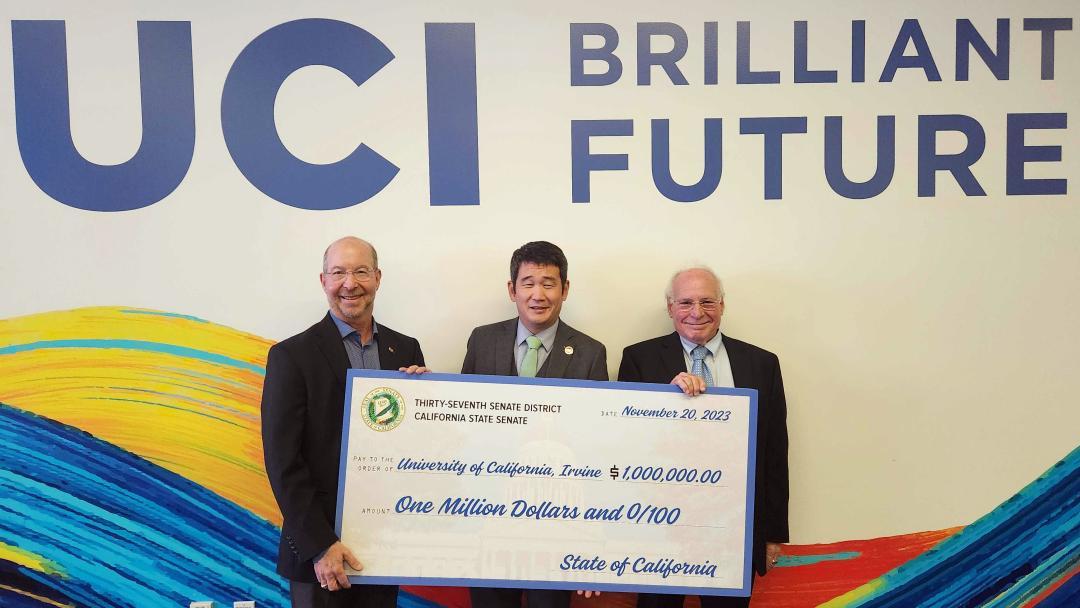
Dean Jon Gould, left, and Water UCI Director David Feldman, right, receive symbolic $1 million check from Sen. Dave Min for diversity initiative. Photo by Han Parker
Water UCI chief floats solutions at 2023 Water Policy Forum
Inclusion, smart planning and public acceptance of innovative reclamation and conservation projects will be necessary for California to create a critically necessary “new paradigm in water management” to meet current and future needs, said a UC Irvine expert on the subject at today’s 2023 Water Policy Forum on campus.
Water UCI Director David Feldman, a professor of urban planning and public policy and political science, was a member of the panel assembled by State Sen. Dave Min (D-Irvine), who moderated the forum and chairs the Senate Committee on Natural Resources and Water. Other panelists included Megan Yoo Schneider, board president of the Municipal Water District of Orange County; Paul Cook, general manager of the Irvine Ranch Water District; and Katharine Moore, staff director of the Senate Committee on Natural Resources and Water.
Before the moderator and panelists received a warm welcome from UCI’s School of Social Ecology Dean Jon Gould, Min mentioned that “the ideas and insights we gather today at the Water Policy Forum are going to play a big role in securing a future where water is available and sustainable for all Californians.”
Securing that future will require knowledge of all the varied local water issues that exist, Schneider, whose board oversees the regional wholesaler of Orange County water supplies, said during the forum. That set up Feldman’s observation that you can find examples of all the water problems that plague the entire world — as well as the solutions to them — within a 100-mile radius of Irvine.
“What are some of the effective strategies or institutional reforms that we need to be thinking about in Sacramento and elsewhere to ensure that disparities and disparate impacts are mitigated in that we can have a fair and inclusive approach to water management?” Min asked Feldman.
The professor noted that a 2012 California Assembly bill stipulated that every Californian has a right to clean, safe and affordable drinking water and a 2019 Senate bill provided funding to ensure safe drinking water in every California community. And yet, Feldman said, that is not the reality for every Californian nor every California community in 2023.
“In much of California, lower-income residents, people of color and members of underrepresented groups often face more precarious access to a safe and dependable water supply,” said Feldman, who added this is particularly problematic in parts of the state’s Central Valley and Southern California’s Inland Empire.
Many of these residents, especially in the more rural areas, are served by small water utility systems whose ratepayer bases cannot afford upgrades to water supply delivery and wastewater treatment infrastructure and services, said Feldman. He cited California water board and the state Legislative Analyst Office data that finds, in any given year, about 400 water systems throughout the state can be classified as failed systems. Besides being “undercapitalized,” these systems often lack the technical resources to apply for one-time grants that could bail them out, Feldman added.
A statewide water supply and floodwater abatement system that served California well for decades has become out of date as declining infrastructure, severe drought and climate change have become the new norm, Feldman said. Diverting water great distances supported growing cities and helped transform California to the world’s fifth largest economy, he said, but now rivers no longer function naturally, hydrologically robust systems relying on long-distance diversion have become limited options and too much planning and development have historically ignored smart water management.
“What we can do going forward to basically change this trajectory,” Feldman said, is add representatives of tribal and underserved communities to water agency boards and other governance bodies, support workforce diversity initiatives and programs, and help tribes and the underserved finance adequate and affordable water supplies.
“I think there's a tendency in our society often to think of command-and-control solutions as being the best options,” he said. “I'd like to make a pitch for markets and economic incentives.” He then suggested water system stakeholders purchase water rights and re-distribute them equitably and provide economic incentives to ratepayers who conserve water and, by contrast, penalize those who waste or use too much of the precious resource.
The 2023 Water Policy Forum also included Min presenting a symbolic check of $1 million to UC Irvine for its Inclusive, Diverse, Equitable, and Able Leaders (IDEAL) for Water Program, which promotes education, training, and career placement of underrepresented groups in the water sector and ensures that Orange County remains a world leader in water conservation. Gould and Feldman accepted the check from Min, who had championed the IDEAL grant from the University of California Office of the President through the Budget Act of 2023.
“UC Irvine and the School of Social Ecology are dedicated to not only studying social problems but also helping to solve them,” Gould said. “In this spirit, we were honored and delighted to welcome Senator Min and fellow experts to campus to discuss water policy, an issue of concern across California. We are especially appreciative of the Senator’s leadership to help secure support for UC Irvine’s IDEAL for Water Program, which will benefit many throughout Orange County and beyond.”
— Matt Coker
Watch the full Water Forum discussion on YouTube: